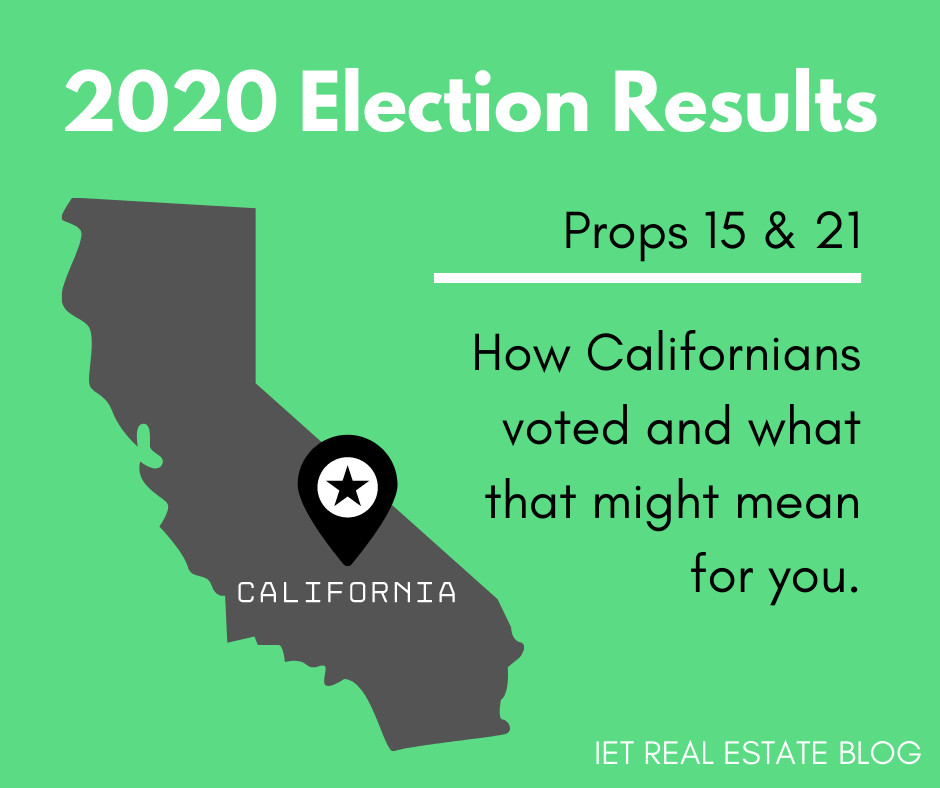
On November 2nd, everybody knew that as it always does, California would vote Blue––what wasn't certain was how they'd decide on several propositions that were on the 2020 ballot. Props 15 & 21 were two issues that would have a major effect on the real estate industry in Los Angeles. What was the outcome and how will that affect you? Read on to find out.
Prop 15: NO
What is Prop 15? To put it simply, a "yes" on Prop 15 would loosen commercial and industrial property tax limits.
In 1978, Proposition 13 was passed which stipulated that commercial properties pay taxes on the value of a space when it was first purchased. It limits the tax rate to 1% of that value amount, and the assessed value cannot increase more than 2% each year.
As you can imagine, if a property was bought in, say, the 1980's, the taxes on that would be significantly lower than if the property was purchased in 2020. Prop 15 would force these commercial spaces to pay taxes on what the value of the property would be today instead of the year they bought it. Then, all of that extra money would be put back into the community––the revenue gain has been estimated at about 12 billion dollars a year.
Opponents of the prop said that a pandemic was not the time to significantly increase taxes on already struggling businesses. Proponents said that it would fix the damage of Prop 13 that has starved schools and local governments of much-needed tax dollars.
Ultimately, 52% of Californians voted NO on Prop 15, effectively upholding Prop 13. What does that mean for you?
If you're a small business owner, it potentially means the difference between surviving the pandemic or going under. Although the prop had some protections in place for these entrepreneurs–the tax rate for properties valued under 3 million dollars wouldn't be affected–it wouldn't save everyone. Many small business owners rent their property within a space that's worth over 3 million dollars. Oftentimes, the landlords of these properties pass the property tax burden onto the renter. If you're one such renter, there would be nothing stopping your landlord from charging you the increased property tax amount. If you're a small restaurant operating out of a pricey Silver Lake strip mall, that extra charge each month might very well be the straw that breaks the camel's back, forcing you to close.
Another thing to consider is that even huge companies are struggling during the pandemic. Remember when The Cheesecake Factory said that it couldn't afford to pay their rents in April? Large chains may seem like they have the money to spare, but many do not, and the added financial burden could cause many to close, resulting in mass job losses throughout California. It could also mean that businesses would stay open, but their prices would increase dramatically.
Of course, we all want more money to go to our schools and local governments, but Prop 15 wasn't particularly comprehensive and there would be a lot of unpredictable and unintended consequences if it had passed.
Prop 21: NO
Prop 21 was another attempt at expanding rent control in California after a similar prop failed during the 2018 election. With the exception of San Francisco, every county in California opposed it, with 59.8% of voters rejecting Prop 21.
The prop itself didn't mandate any new rent controls, it would only allow individual counties and cities to create and pass new rent controls on apartments built before 2006 and single-family homes or condos owned by landlords who oversee more than two properties. Between San Francisco and Los Angeles, an estimated 200,000 apartments would be newly eligible for rent control.
Obviously, landlords and property developers of apartment buildings were opposed to the initiative. However, if you're a small-time landlord owning three rental properties or more, Proposition 21 passing would mean a major financial hit for you, too. Your ability to raise rent could have potentially been restricted even as tenants move out and property values rise.
With the decisive opposition to Prop 21, you don't have to worry about that. So, if you're looking to invest in a rental property in East Hollywood or the surrounding areas, email us or gives us a call at (323) 412-9060.
Posted by Ben Nicolas on
Leave A Comment